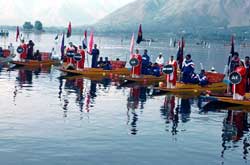| Kashmir's two natural advantages are its mountains on the one hand, and lakes and rivers on the other. These waterways enhance the beauty of the land and are among the chief sources that attract tourists to its verdant valleys. But more than just a means of pleasure, the waterways are an activity-oriented way of discovering new leisure sports.
To those of you who are by nature passive, there is little more needed than a willing nod to a passing shikarawala before you are invited on board these narrow boats with their spring-cushion seats and chintz curtains. You can command a shikara on the Dal and Nagin Lakes in Srinagar for just a crossing, or for a whole day, and discover the tranquillity of being gently carried over water from one scenic spot to another. You can also stretch your time limit by actually staying aboard a houseboat so you wake to the sound of soft waves crashing beside your bedroom window.
A variation on this can be the hiring of a motorboat, if you prefer travelling faster over water. Or better still, when the summer days are balmy, go water skiing.
The Jhelum River has remained the lifeline of Srinagar, and there are people who live on the river in boats, called doongas. These water- people claim to be descendants of Noah. If you hire a slow boat from them, you can actually visit old parts of Srinagar where, because of narrow and winding roads, access by taxi is quite slow. The advantage of going by boat is that you get to see numerous old mosques and temples, as well as attractive houses, that line the banks but cannot be viewed or photographed from land. Constructed of wood, and with carved and latticed balconies and verandas, they are well maintained and preserve the ancient heritage of Srinagar.
 |
|
As you float past the houseboats moored along the riverfront, you also have the opportunity to observe the life of the people of Kashmir. In succession, the numerous bridges spanning the Jhelum pass by (and at places are ferry services for local travel). Srinagar city is located by the banks of river Jhelum, between Zero Bridge and Chattabal where a weir controls the water level on this stretch. A small lock on the west bank allows the movement of boats up or down stream. Once past Chattabal, the river changes character as it widens and meanders past villages in the valley and flows into the giant Wular Lake. The journey can be terminated at the picturesque Manasbal Lake. |